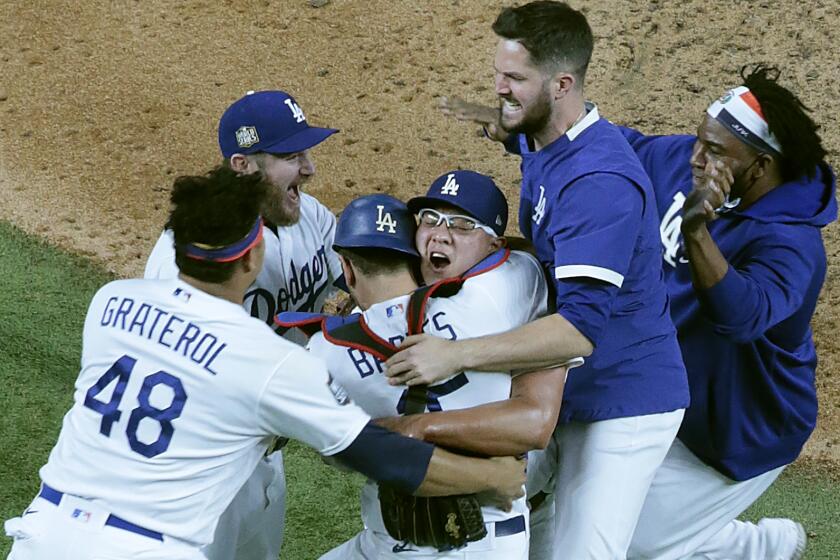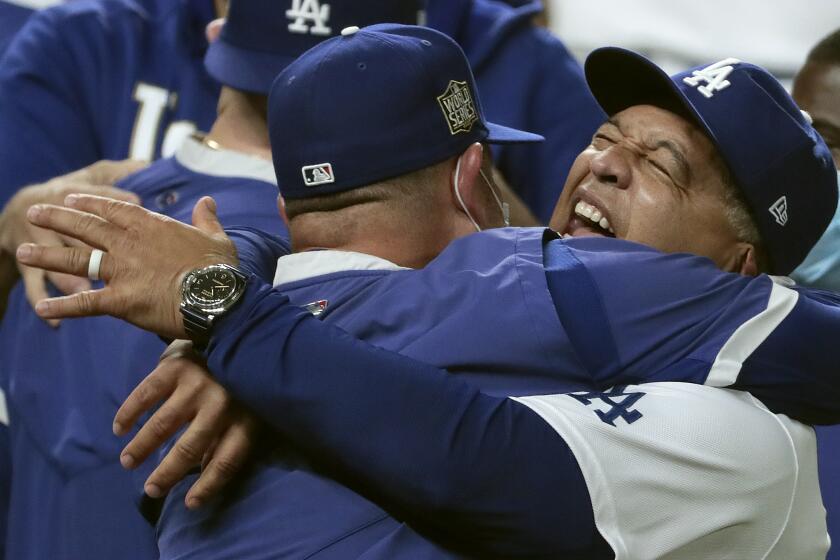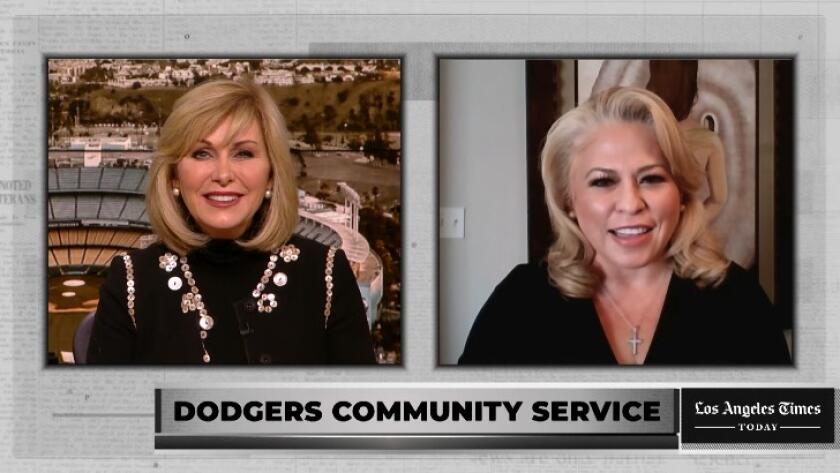Leader of Dodgers’ substantial community efforts knows loss as well as achievement
- Share via
Naomi Rodriguez calls them “aha” moments, reminders of why a job of supreme difficulty also feels supremely fulfilling.
As the Dodgers’ vice president of external affairs and community relations, they usually come in the most trying of circumstances — when some part of the city around her is broken, and only the iconic shade of Dodger blue can help fix it.
There was the time she and Matt Kemp met a boy in Los Angeles County Hospital, the victim of a car crash that killed his father and two siblings. They both got choked up when the boy, hardly able to move because of severe burns, softly smiled when the popular Dodgers outfielder entered the room.
There was the visit Rodriguez organized of 21 Dodgers players to Saugus High School in January, weeks after a student shooting had rocked the campus. Raw emotions, turned to raucous cheers when the team entered a pep rally in the gym. The reeling student body cheered on the Dodgers. The Dodgers cheered them right back.
And then there was this summer, when Rodriguez helped coordinate Dodger Stadium’s pandemic-relief transformations: a Salvation Army food distribution drive-through in front of the box office; a drive-up COVID-19 testing site with a line that often stretched along the surrounding streets; a socially distanced voting center on the stadium’s iconic top deck this week.
“Those are life-changing moments, and I’m a part of that,” Rodriguez said, pinching herself after six years in a dream job. “I’m helping lead that.”
The Dodgers estimate that hundreds of thousands of children and families have been affected by initiatives spearheaded by Rodriguez, whose wavy blond hair and wide bright smile have become a symbol of goodness around Chavez Ravine.
“It really has been an awesome relationship that we’ve had,” Justin Turner, the Dodgers’ nominee for Major League Baseball’s Roberto Clemente Award recognizing community involvement, said in September of Rodriguez, who in August was named to Sport Business Journal’s 2020 class of Game Changers: Women in Sports Business.
L.A. City Councilman Gil Cedillo, a longtime friend and collaborator with Rodriguez on initiatives that involve the team and city, echoed: “It’s just a joy to work with somebody who’s very professional, very conscientious, very courageous .... I love her, because she knows the community.”
Complete coverage of the Dodgers winning their first World Series championship since 1988 after defeating the Tampa Bay Rays in the 2020 World Series.
Perhaps that is because the East L.A. native is from the community, shaped by a family that dedicated itself to giving back. There is a personal purpose behind her every action — roots planted deep in a backstory of loss and heartbreak that have sprouted a career of selflessness and service.
::
Rodriguez can recount almost all the stories she’s ever heard about her dad, Eugene.
She’s been told the tales of his troubled beginnings, how he struggled with drug addiction as a teenager and spent many of his early years in juvenile centers, county jails and, for a stretch, San Quentin State Prison.
She can recite his midlife redemption, a transformation that her mother, Cynthia, can still only describe as a literal come-to-Jesus reckoning resulting from counseling sessions with a Christian addiction group that helped him get clean.
She knows the painful details of her father’s death too, when he was run over by a motorcycle on Feb. 2, 1977, while crossing a street outside his Victorville church. He was dead by the time he reached the hospital. His rustic tan dress shoes had been blown right off his feet.
Rodriguez wasn’t even 2 years old that day. Yet, more than four decades later, she speaks of her father as if she’d known him all his life. The stories of how he rededicated himself in service of others continue to resonate the most.
“We’re going to start our new life together,” Eugene once told Cynthia, dialogue their daughter can describe by heart. “But the only way I can get through this is if we help other young men and women like me, other people that need help in our community.
“This is going to be our life’s mission.”
And so it was.
In 1973, Eugene and Cynthia moved to a rundown dude ranch in rural Apple Valley in San Bernardino County and started a foster home for children. At first, they watched over just three boys. Within two years, they had 16 teenage kids living in their care.
“It was like all of heaven opened up for us,” Cynthia said by phone recently, estimating that about 80 children passed through the ranch during their years of running it together. “Everything just happened so fast.”
Eugene and Cynthia provided much more than food and a bed. They brought in tutors and psychologists to work with the foster kids. She said they plowed every penny they earned into improving their modest plot of land. On weekends they loaded up their vans and took their leftover meals, clothes and blankets to give away to people living in poverty along the Mexican border.
Most of all, they took children from fractured homes and gave them one that was whole again.
“My parents did not have a lot of money,” Naomi Rodriguez said. “But they made it happen. They made it work.”
“My parents dedicated their life to giving back to our community. That’s always been in my spirits. It’s how I grew up. It’s who I am.”
— Naomi Rodriguez
Eugene had bigger plans too. He wanted to expand and care for more displaced children. When the San Bernardino County Sun newspaper wrote a story about the ranch in 1975, he declared his intention to open a full-time school.
Eugene’s death kept those dreams from coming true. Suddenly a single mother of three, Cynthia moved the family back to East Los Angeles to be closer to relatives, reluctantly leaving their sanctuary behind.
The dozens of foster kids, however, didn’t disappear from her life. Even today, Cynthia keeps in touch with many of them. They still call her Mom. They still thank her for everything she and Eugene gave them.
“My parents dedicated their life to giving back to our community,” Rodriguez said. “That’s always been in my spirits. It’s how I grew up. It’s who I am. It’s part of what drives me.”
::
Rodriguez had that message reinforced by her mother over the course of her childhood.
A former nurse, Cynthia remained philanthropically engaged after the family returned to East L.A. She volunteered through their church. She helped care for victims of sexual abuse and rape. She worked with the elderly. Her kids nicknamed her “The Advocate.”
“That’s the spirit of my mother,” Rodriguez said.
Rodriguez wasn’t the only sibling in her family who wanted to follow in their parents’ footsteps.
Her eldest brother, Luigi, was 24 when he announced he wanted to enroll in a Bible college after getting an associate of arts degree at Azusa Citrus College. He had dreams of being a missionary in Africa. His fiancee supported it all. So did his mother.
“Well, son,” Cynthia remembers telling him, “you did what your father wanted you to do.”
But then one night, he didn’t come home.
After working a graveyard shift at UPS, Luigi got into a car crash. Because he was placed in a coma, it took the California Highway Patrol a day to identify him. They finally connected his car to Cynthia and asked her to confirm their John Doe was her son. Luigi passed away a few days later, on June 1, 1986. It was the eve of his wedding day.
“I remember the limo came to our house to pick us up,” Rodriguez said. “I remember looking out the window and our mom was downstairs telling the limo driver. I remember him saying, ‘No, no, no. No way this happened.’”
Already a crucial figure in ending one long World Series drought, Dave Roberts and his steady cool exorcised the Dodgers’ demons — and some of his own.
But Rodriguez and her mother remember something else too. In the weeks before his death, a “60 Minutes” segment inspired Luigi to become an organ donor, just in case. What seemed like a small decision turned out to have a massive impact. Twelve people received transplants. Cynthia went on to be a long-serving advocate in the organ donor community as well.
Rodriguez was only in sixth grade then. But she knew what path she wanted her life to take.
“It’s what drives me,” she said. “It’s what started my role in public service. It’s there every day. I don’t know how many people you know who have lost their father and their brother in the same family. I don’t wish that on anybody. But I know that they’re with me. I often say, ‘Why did that happen?’ But then I flip it, and I say, ‘I’m in this amazing position to help others, to show compassion.’”
::
That internal drive led Rodriguez right into public service after finishing college at Long Beach State. She began as a front desk assistant, worked for the Los Angeles consulate general of Israel, and eventually became an assistant deputy mayor under Jim Hahn from 2002 to 2005.
After that, she went into the private sector, working in DirecTV’s marketing and public relations departments, then became a senior director for a nonprofit organization, Los Angeles Universal Preschool. But she never envisioned herself working in sports — not until the Dodgers opportunity arose in 2014.
“I was a little bit nervous about the baseball side,” she recalled when she went to interview. “If you’re going to ask me statistics, I can’t answer that. But I can tell you what it’s like to walk up those stairs at Dodger Stadium, that hill, as a little girl and smell the hot dogs and the cracking of the bat and looking at my brother and enjoying a ballgame.
“I can tell you what it’s like to have your family from East Los Angeles and what the city means to your family, what the Dodgers mean to your family. That is who I am.”
With every “aha” moment since, she’s felt a little more connected to the community, to her family.
She cherished a Saugus High yearbook page commemorating the Dodgers’ trip and believes this summer’s coronavirus testing site at Dodger Stadium, which was capable of performing as many as 6,000 tests per day, was “probably the most important thing we ever do, is have this COVID testing site on our campus.”
And she knows there are no limits on ways to help others, no bounds — especially with the Dodgers — on her ability to give back. Her family taught her that.
“I remember the stories, and I think about my work and how you change lives, affect lives,” she said. “That is what I carry with me in my work. Sometimes I have to take a step back. We’re playing baseball. We bring entertainment to families. But it’s bigger than baseball. It’s more powerful than that.”
- Share via
Watch L.A. Times Today at 7 p.m. on Spectrum News 1 on Channel 1 or live stream on the Spectrum News App. Palos Verdes Peninsula and Orange County viewers can watch on Cox Systems on channel 99.
More to Read
Are you a true-blue fan?
Get our Dodgers Dugout newsletter for insights, news and much more.
You may occasionally receive promotional content from the Los Angeles Times.














